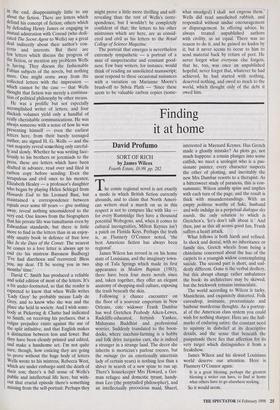the end, disappointingly little to say about the fiction. There
are letters which the end, disappointingly little to say about the fiction. There are letters which defend his concept of fiction; others which by defending Henry James or engaging in mutual admiration with Conrad (who dedi- cated The Secret Agent to Wells) say a great deal indirectly about their author's con- cerns and interests. But there are few letters which discuss the progress of the fiction, or mention any problems Wells is having. They discuss the fashionable Fabian subjects of the novels, but nothing more. One might come away from the collected letters with the impression — which cannot be the case — that Wells thought that fiction was merely a continua- tion of political philosophy by other means. He was a prolific but not especially accomplished writer of letters, and four thickish volumes yield only a handful of really cherish able communications. He was always someone with a sense of how he was presenting himself — even the earliest letters here, from their barely teenaged author, are signed H. G. Wells — and the vast majority reveal something only careful- ly and slowly. Whether he was writing face hously to his brothers or jeremiads to the press, these are letters which have been drafted in advance, read over and filed in carbon copy before sending. Even the scrupulous and civil ones to his mentor, Elizabeth Healey — a professor's daughter who began by playing Helen Schlegel from Howards End to his Leonard Bast, but maintained a correspondence between equals over some 60 years — give nothing away, reveal nothing unconsidered to the very end. One knows from the biographers that his private life was tumultuous even by Edwardian standards, but there is little more to find in the letters than in an enjoy- ably smutty book in defence of free love like In the Days of the Comet. The nearest he comes to a love letter is always apt to end (to his mistress Baroness Budberg) `I've had diarrhoea and recovered. Bless You, my dear. be seeing you in two months' time.'
David C. Smith has produced a reliable and solid edition of most of the letters. It's a bit under-footnoted, so that the reader is expected to know that when Wells writes `Lady Grey' he probably means Lady de Grey, and to know who she was and the place she held in society. And I wish some- body at Pickering & Chatto had indicated to Smith, on receiving his prefaces, that a vulgar prejudice exists against the use of the split infinitive, and that English makes a distinction between less and fewer. But they have been cleanly printed and edited, and make a handsome set. I'm not quite sure, though, how enticing they are going to prove without the huge body of letters Wells wrote to his mistress, Rebecca West, which are under embargo until the death of their son; there's a full sense of Wells's public and intellectual life here, but with- out that crucial episode there's something missing from the self-portrait. Perhaps they might prove a little more thrilling and self- revealing than the rest of Wells's corre- spondence, but I wouldn't be completely confident of that; the letters to his other mistresses which are here, are as consid- ered and civil as his letters to the Royal College of Science Magazine.
The portrait that emerges is nevertheless extremely sympathetic — a portrait of a man of unspectacular and constant good- ness. Few busy writers, for instance, would think of reading an unsolicited manuscript; most respond to these occasional nuisances with a variation on Marianne Moore's brush-off to Sylvia Plath — 'Since these seem to be valuable carbon copies (some- what smudged) I shall not engross them.' Wells did read unsolicited rubbish, and responded without undue encouragement or disparagement. In offering advice, he always treated unpublished authors with civility, as an equal. There was no reason to do it, and he gained no kudos by it; but it never seems to occur to him to send material back by return of post. He never forgot what everyone else forgets, that he, too, was once an unpublished hopeful; never forgot that, whatever he had achieved, he had started with nothing, deserved nothing, and owed so much to the world, which thought only of the debt it owed him.

























































 Previous page
Previous page